不定代词的用法
- 格式:doc
- 大小:44.50 KB
- 文档页数:3
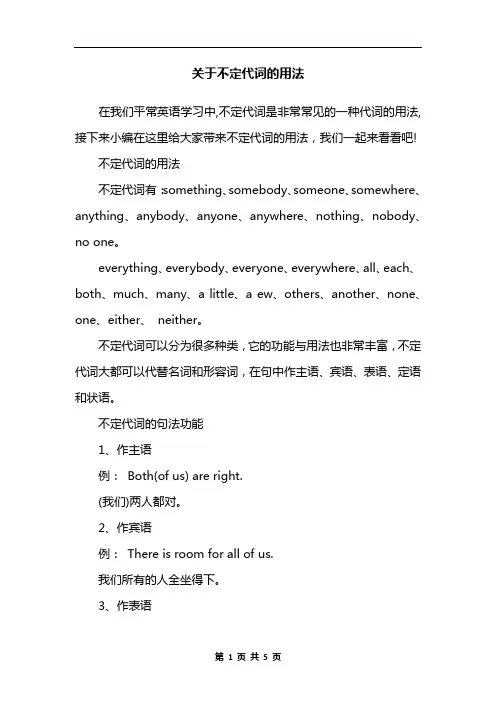
关于不定代词的用法在我们平常英语学习中,不定代词是非常常见的一种代词的用法,接下来小编在这里给大家带来不定代词的用法,我们一起来看看吧!不定代词的用法不定代词有:something、somebody、someone、somewhere、anything、anybody、anyone、anywhere、nothing、nobody、no one。
everything、everybody、everyone、everywhere、all、each、both、much、many、a little、a ew、others、another、none、one、either、neither。
不定代词可以分为很多种类,它的功能与用法也非常丰富,不定代词大都可以代替名词和形容词,在句中作主语、宾语、表语、定语和状语。
不定代词的句法功能1、作主语例:Both(of us) are right.(我们)两人都对。
2、作宾语例:There is room for all of us.我们所有的人全坐得下。
3、作表语例:Thats nothing.没什么。
4、作定语例:You may take either road.两条路你走哪条都行。
向左转|向右转扩展资料1、除every 和no外,不定代词既可用作名词,也可用作形容词。
every和no在句中只能作定语.例如:I have no idea about it.我没有任何主意。
2、all指三者以上,是都的意思。
all的单复数由它所修饰或指代的名词的单复数决定。
例如:All goes well.一切进展得很好。
all 通常不与可数名词单数连用,如:不说all the book,而说the whole book.但all可与表时间的可数名词单数连用,如all day,all night,all the year;但习惯上不说all hour,all century.all还可以与一些特殊的单数名词连用,如all China,all the city,all my life,all the way.3、both都,指两者。
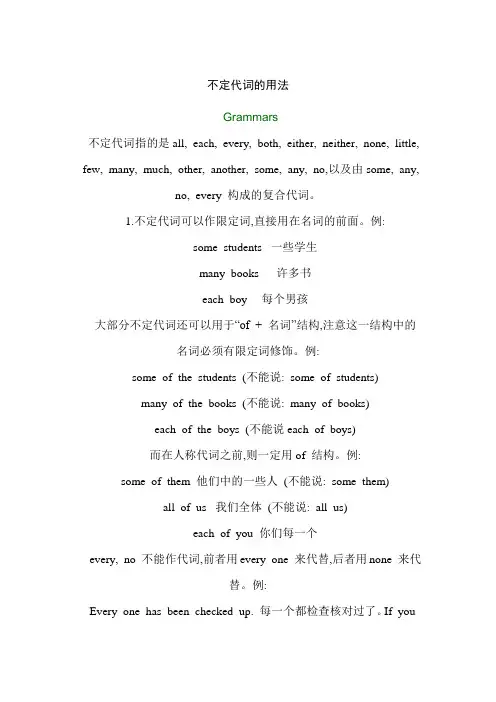
不定代词的用法Grammars不定代词指的是all, each, every, both, either, neither, none, little, few, many, much, other, another, some, any, no,以及由some, any,no, every 构成的复合代词。
1.不定代词可以作限定词,直接用在名词的前面。
例:some students 一些学生many books 许多书each boy 每个男孩大部分不定代词还可以用于“of + 名词”结构,注意这一结构中的名词必须有限定词修饰。
例:some of the students (不能说: some of students)many of the books (不能说: many of books)each of the boys (不能说each of boys)而在人称代词之前,则一定用of 结构。
例:some of them 他们中的一些人(不能说: some them)all of us 我们全体(不能说: all us)each of you 你们每一个every, no 不能作代词,前者用every one 来代替,后者用none 来代替。
例:Every one has been checked up. 每一个都检查核对过了。
If youneed a repairman, there's none better than my brother.如果你需要一位修理工,没有谁比我的弟弟更好的了。
everyone/everybody 之后不接of短语,而every one 之后接of 短语。
例:Every one of us was surprised to hear the news. 我们每一个人听了这个消息后都很惊奇。
all 或both 后接of短语时,of 常常省去。
例:all (of) my friends 我的所有朋友both (of) Tom's friends 汤姆的两个朋友2.little 和few 都可以作代词和限定词用,little 用来指不可数的事物或修饰不可数的事物;而few 则用来指可数的事物(人)或修饰可数的事物(人)。
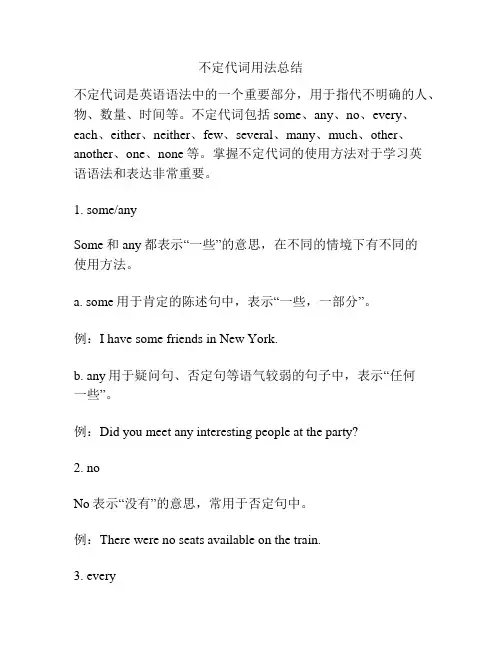
不定代词用法总结不定代词是英语语法中的一个重要部分,用于指代不明确的人、物、数量、时间等。
不定代词包括some、any、no、every、each、either、neither、few、several、many、much、other、another、one、none等。
掌握不定代词的使用方法对于学习英语语法和表达非常重要。
1. some/anySome和any都表示“一些”的意思,在不同的情境下有不同的使用方法。
a. some用于肯定的陈述句中,表示“一些,一部分”。
例:I have some friends in New York.b. any用于疑问句、否定句等语气较弱的句子中,表示“任何一些”。
例:Did you meet any interesting people at the party?2. noNo表示“没有”的意思,常用于否定句中。
例:There were no seats available on the train.3. everyEvery表示“每一个”的意思。
例:Every student is required to attend the meeting.4. eachEach表示“每一个”,用于强调个体。
例:Each student is responsible for his or her own progress.5. either/neitherEither表示“两者中的任何一个”,neither表示“两者都不”。
例:You can choose either the blue or the red dress.例:Neither of us likes to cook.6. few/several/many/much这些代词都用于表示数量或程度。
a. few表示“很少,几乎没有”。
例:There were few people in the park on such a hot day.b. several表示“几个,若干”。
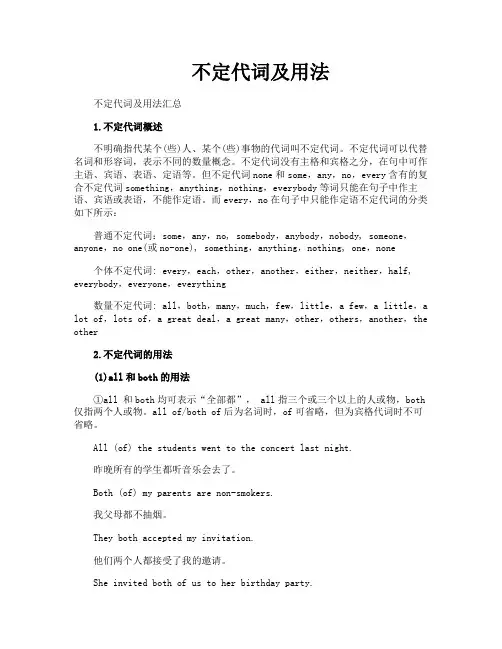
不定代词及用法不定代词及用法汇总1.不定代词概述不明确指代某个(些)人、某个(些)事物的代词叫不定代词。
不定代词可以代替名词和形容词,表示不同的数量概念。
不定代词没有主格和宾格之分,在句中可作主语、宾语、表语、定语等。
但不定代词none和some,any,no,every含有的复合不定代词something,anything,nothing,everybody等词只能在句子中作主语、宾语或表语,不能作定语。
而every,no在句子中只能作定语不定代词的分类如下所示:普通不定代词:some,any,no, somebody,anybody,nobody, someone,anyone,no one(或no-one), something,anything,nothing, one,none个体不定代词: every,each,other,another,either,neither,half, everybody,everyone,everything数量不定代词: all,both,many,much,few,little,a few,a little,a lot of,lots of,a great deal,a great many,other,others,another,the other2.不定代词的用法(1)all和both的用法①all 和both均可表示“全部都”, all指三个或三个以上的人或物,both 仅指两个人或物。
all of/both of后为名词时,of可省略,但为宾格代词时不可省略。
All (of) the students went to the concert last night.昨晚所有的学生都听音乐会去了。
Both (of) my parents are non-smokers.我父母都不抽烟。
They both accepted my invitation.他们两个人都接受了我的邀请。
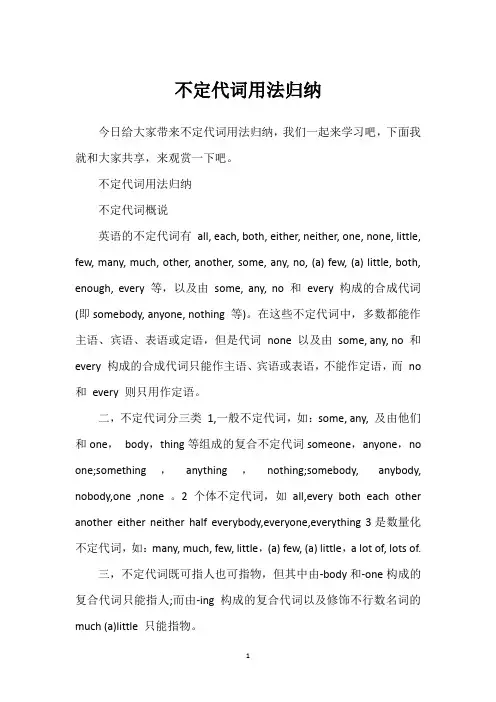
不定代词用法归纳今日给大家带来不定代词用法归纳,我们一起来学习吧,下面我就和大家共享,来观赏一下吧。
不定代词用法归纳不定代词概说英语的不定代词有all, each, both, either, neither, one, none, little, few, many, much, other, another, some, any, no, (a) few, (a) little, both, enough, every 等,以及由some, any, no 和every 构成的合成代词(即somebody, anyone, nothing 等)。
在这些不定代词中,多数都能作主语、宾语、表语或定语,但是代词none 以及由some, any, no 和every 构成的合成代词只能作主语、宾语或表语,不能作定语,而no 和every 则只用作定语。
二,不定代词分三类1,一般不定代词,如:some, any, 及由他们和one,body,thing等组成的复合不定代词someone,anyone,no one;something,anything,nothing;somebody, anybody, nobody,one ,none 。
2个体不定代词,如all,every both each other another either neither half everybody,everyone,everything 3是数量化不定代词,如:many, much, few, little,(a) few, (a) little,a lot of, lots of.三,不定代词既可指人也可指物,但其中由-body和-one构成的复合代词只能指人;而由-ing构成的复合代词以及修饰不行数名词的much (a)little 只能指物。
比如:There is much to do.有许多事情要做。
(要做许多事情)Someone will pay the bill.有人会付帐。
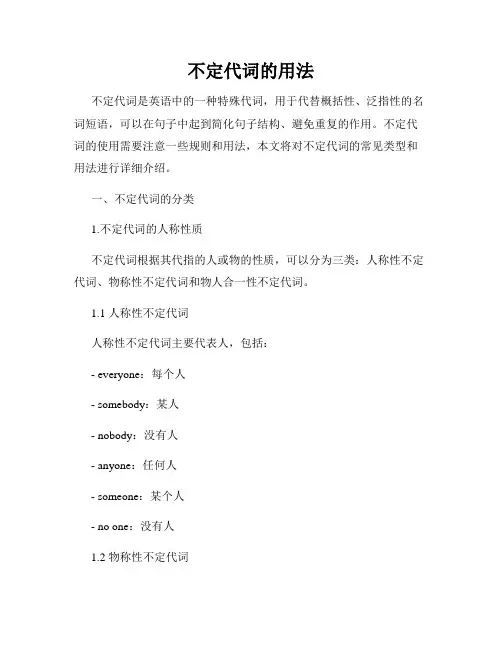
不定代词的用法不定代词是英语中的一种特殊代词,用于代替概括性、泛指性的名词短语,可以在句子中起到简化句子结构、避免重复的作用。
不定代词的使用需要注意一些规则和用法,本文将对不定代词的常见类型和用法进行详细介绍。
一、不定代词的分类1.不定代词的人称性质不定代词根据其代指的人或物的性质,可以分为三类:人称性不定代词、物称性不定代词和物人合一性不定代词。
1.1 人称性不定代词人称性不定代词主要代表人,包括:- everyone:每个人- somebody:某人- nobody:没有人- anyone:任何人- someone:某个人- no one:没有人1.2 物称性不定代词物称性不定代词主要代表物,包括:- everything:每件事物- something:某件事物- nothing:没有事物- anything:任何事物1.3 物人合一性不定代词物人合一性不定代词既可以代表人也可以代表物,包括:- both:两者- either:任意一个- neither:两者都不- all:所有的2.不定代词的数量性质不定代词根据其数量性质,可以分为两类:肯定性不定代词和否定性不定代词。
2.1 肯定性不定代词肯定性不定代词主要用于肯定句中,包括:- some:一些- any:任何2.2 否定性不定代词否定性不定代词主要用于否定句中,包括:- no:没有- none:没有一个- neither:两者都不二、1. 表示泛指或概括不定代词常用于泛指或概括的情况,用于代替不具体指向的名词短语。
例如:- Everyone should take care of themselves.(每个人都应该照顾自己。
)- I want to buy something for my mom.(我想给我妈妈买点什么。
)2. 用于疑问句不定代词还常用于疑问句中,表示对某个人或物的询问。
例如:- Is anyone there?(有人在吗?)- Do you have anything to eat?(你有吃的东西吗?)3. 用于否定句不定代词在否定句中起到强调的作用,用于表示没有、没有一个等含义。
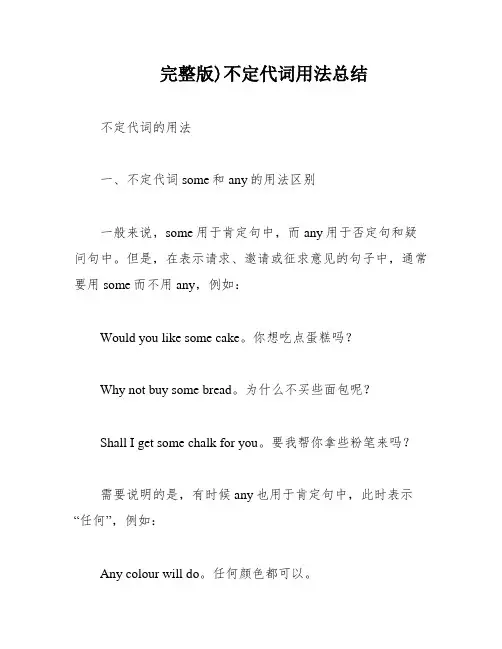
完整版)不定代词用法总结不定代词的用法一、不定代词some和any的用法区别一般来说,some用于肯定句中,而any用于否定句和疑问句中。
但是,在表示请求、邀请或征求意见的句子中,通常要用some而不用any,例如:Would you like some cake。
你想吃点蛋糕吗?Why not buy some bread。
为什么不买些面包呢?Shall I get some chalk for you。
要我帮你拿些粉笔来吗?需要说明的是,有时候any也用于肯定句中,此时表示“任何”,例如:Any colour will do。
任何颜色都可以。
Come any day you like。
你随便哪天来都可以。
二、不定代词many和much的用法以及区别不定代词many和much都表示“许多”,但many修饰或代替可数名词(复数),与few(少数)相对;而much用来修饰或代替不可数名词(单数),与little(少量)相对。
在口语中,两者主要用于非肯定句中,例如:Did you see many people there。
你在那儿看见许多人了吗?We don’t have much time。
我们没有许多时间。
XXX work has been done。
许多工作都已经做了。
You’ve given me too much。
你给我太多了。
Take as many (much) as you want。
你要多少拿多少。
I asked her a great many ns。
我问了她许多问题。
另外需要注意的是,too much可以作副词或代词,也可以用作形容词修饰不可数名词,例如:Is watching TV too much good or bad for your health。
看电视太多对你的健康有益还是有害?You’ve given me too much。
你给我的太多了。
We’ve had too much rain lately。

初中常用不定代词用法 -CAL-FENGHAI-(2020YEAR-YICAI)_JINGBIAN初中常用不定代词用法不指明代替任何特定名词或形容词的代词叫做不定代词。
常用不定代词有:some,any,all ,none,both,either,neither,each, every,other,another,much,many,few,little,one等。
一、不定代词的用法不定代词大都可以代替名词和形容词,在句中作主语、宾语、表语和定语。
1.作主语Both of them are teachers.他们两人都是教师。
2.作宾语I know nothing about this person.我对这个人一无所知。
3.作表语This book is too much for a child.这本书对一个小孩来说太难了。
4.作定语There is a little water in the glass.玻璃杯里有一些水。
二、常用不定代词用法举例1.some 一些,某些,某个不定代词some可以代替名词和形容词,常用在肯定句中作主语、宾语、定语等。
作定语时,它可以修饰可数名词(单、复数皆可)和不可数名词。
例如:Some are doctors,some are nurses.有些人是医生,有些人是护士。
(作主语)2.any一些,任何不定代词any可以代替名词和形容词,常用在否定句或疑问句中作主语、宾语、定语等。
作定语时,它可以修饰可数名词(多为复数)和不可数名词。
例如:There isn’t any ink in my pen.我的钢笔没有墨水。
(作定语)不定代词any有时也可以用在肯定句中,表示"任何的"。
例如:You may come at any time;I’ll be home the whole day.你任何时候来都行,我整天都将呆在家里。
不定代词any也可以用作副词,做状语,表示程度。
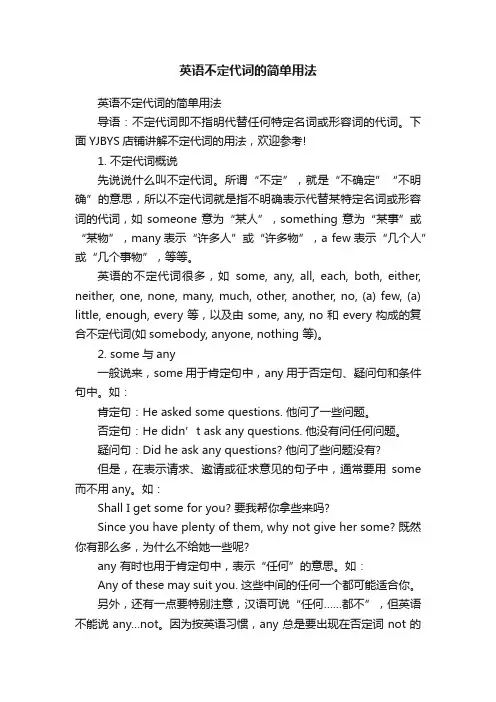
英语不定代词的简单用法英语不定代词的简单用法导语:不定代词即不指明代替任何特定名词或形容词的代词。
下面YJBYS店铺讲解不定代词的用法,欢迎参考!1. 不定代词概说先说说什么叫不定代词。
所谓“不定”,就是“不确定”“不明确”的意思,所以不定代词就是指不明确表示代替某特定名词或形容词的代词,如someone意为“某人”,something意为“某事”或“某物”,many表示“许多人”或“许多物”,a few表示“几个人”或“几个事物”,等等。
英语的不定代词很多,如some, any, all, each, both, either, neither, one, none, many, much, other, another, no, (a) few, (a) little, enough, every 等,以及由 some, any, no 和 every 构成的复合不定代词(如somebody, anyone, nothing 等)。
2. some与any一般说来,some 用于肯定句中,any 用于否定句、疑问句和条件句中。
如:肯定句:He asked some questions. 他问了一些问题。
否定句:He didn’t ask any questions. 他没有问任何问题。
疑问句:Did he ask any questions? 他问了些问题没有?但是,在表示请求、邀请或征求意见的句子中,通常要用some 而不用any。
如:Shall I get some for you? 要我帮你拿些来吗?Since you have plenty of them, why not give her some? 既然你有那么多,为什么不给她一些呢?any 有时也用于肯定句中,表示“任何”的意思。
如:Any of these may suit you. 这些中间的任何一个都可能适合你。
另外,还有一点要特别注意,汉语可说“任何……都不”,但英语不能说any…not。
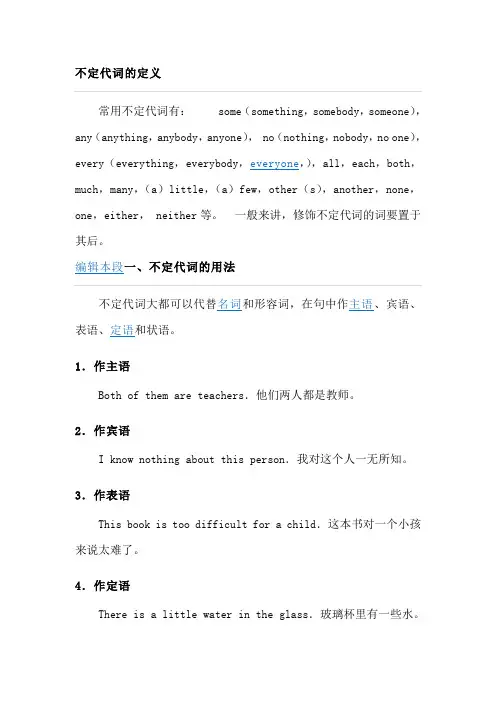
不定代词的定义常用不定代词有:some(something,somebody,someone),any(anything,anybody,anyone), no(nothing,nobody,no one),every(everything,everybody,everyone,),all,each,both,much,many,(a)little,(a)few,other(s),another,none,one,either, neither等。
一般来讲,修饰不定代词的词要置于其后。
编辑本段一、不定代词的用法不定代词大都可以代替名词和形容词,在句中作主语、宾语、表语、定语和状语。
1.作主语Both of them are teachers.他们两人都是教师。
2.作宾语I know nothing about this person.我对这个人一无所知。
3.作表语This book is too difficult for a child.这本书对一个小孩来说太难了。
4.作定语There is a little water in the glass.玻璃杯里有一些水。
5.作状语I can't find my book anywhere.我在任何地方都不能找到我的书。
修饰不定代词的词,一般情况下要后置.编辑本段二、常用不定代词用法举例一般不定代词用法例子1.some 一些,某些,某个不定代词some可以代替名词和形容词,常用在肯定句中作主语、宾语、定语等。
作定语时,它可以修饰可数名词(单、复数皆可)和不可数名词。
例如:some are doctors,some are nurses.有些人是医生,有些人是护士。
(作主语)2.any一些,任何不定代词any可以代替名词和形容词,常用在否定句或疑问句中作主语、宾语、定语等。
作定语时,它可以修饰可数名词(多为复数)和不可数名词。
例如:there isn’t any ink in my pen.我的钢笔没有墨水。
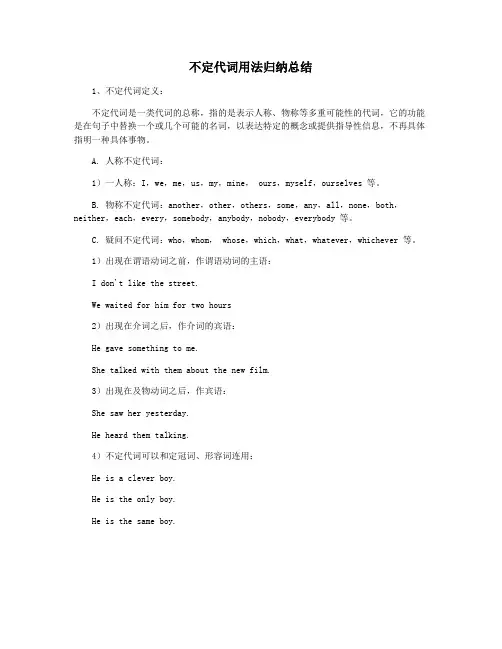
不定代词用法归纳总结
1、不定代词定义:
不定代词是一类代词的总称,指的是表示人称、物称等多重可能性的代词,它的功能是在句子中替换一个或几个可能的名词,以表达特定的概念或提供指导性信息,不再具体指明一种具体事物。
A. 人称不定代词:
1)一人称:I,we,me,us,my,mine, ours,myself,ourselves 等。
B. 物称不定代词:another,other,others,some,any,all,none,both,neither,each,every,somebody,anybody,nobody,everybody 等。
C. 疑问不定代词:who,whom, whose,which,what,whatever,whichever 等。
1)出现在谓语动词之前,作谓语动词的主语:
I don't like the street.
We waited for him for two hours
2)出现在介词之后,作介词的宾语:
He gave something to me.
She talked with them about the new film.
3)出现在及物动词之后,作宾语:
She saw her yesterday.
He heard them talking.
4)不定代词可以和定冠词、形容词连用:
He is a clever boy.
He is the only boy.
He is the same boy.。
不定代词的用法总结不定代词是我们日常语言中经常使用的一种词类,它可以在句子中代替一般名词或特定人或物。
不定代词的使用能够简化句子结构,提高表达的灵活性。
以下将从不同角度总结不定代词的用法。
1. 代替特定人或物有时候我们并不想具体指定一个人或物,这时候就可以使用不定代词来代替特定的名词。
比如,在说到一个未知的人时,我们可以使用"someone";在谈论未知的物品时,我们可以使用"something"。
这样使用不定代词能够在不具体指定人或物的情况下进行表达。
2. 泛指人或物除了代替特定人或物之外,不定代词还可以用来泛指一类人或物。
比如,"anyone"可以用来泛指任何人,"anything"可以用来泛指任何物。
这样使用不定代词能够在不具体指定某一个人或物的情况下进行概括性的表达。
3. 表示数量或程度一些不定代词还可以用来表示数量或程度。
比如,"many"可以表示大量的人或物;"few"表示少量的人或物;"much"表示大量的数量或程度。
这样使用不定代词能够帮助我们清楚地表示出数量或程度的概念。
4. 判断与否定在判断或否定的语句中,不定代词也经常被使用。
比如,在疑问句中,我们可以使用"any",如"Do you have any questions?";在否定句中,我们可以使用"none"代表没有任何人或物,如"There is none left."。
这样使用不定代词能够使句子更加具有表达的准确性。
5. 疑问代词与不定代词的区别虽然疑问代词和不定代词有些时候在句子中起到类似的作用,但是它们之间还是存在一些差异。
不定代词是在句子中代替名词的,而疑问代词则是在句子中引导一个问句。
疑问代词通常包括"who"、"whom"、"what"等,而不定代词包括如上所述的"someone"、"something"等。
不定代词知识点总结不定代词是不指明代替任何特定名词或形容词的代词,在英语语法中有着重要的地位。
下面我们将对不定代词的主要知识点进行总结。
一、不定代词的种类不定代词主要包括 some,many,much,little,few,one,ones,no,neither,nor,each,every,all,both,neither…nor…,only 等。
这些词可以表示人、事物或抽象概念,是构成句子中不可缺少的一部分。
二、不定代词的用法1、替代词:不定代词可以替代名词或名词短语,避免重复。
例如:Can you pass me the book? (用 the book代替 the one I mentioned earlier)。
2、修饰词:不定代词可以用来修饰名词或名词短语,表示数量、程度、性质或特征。
例如:I have a few friends here. (表示数量);He is much taller than her. (表示程度);They are some good books. (表示性质)。
3、构成句子成分:不定代词在句子中可以作主语、宾语、表语或定语等。
例如:Each of us has a different opinion. (作主语);I will do what I can to help. (作宾语);This is none of your business. (作表语)。
三、不定代词的特殊用法1、both…and…:表示“两者都”,连接两个并列的主语时,谓语动词要用复数形式。
例如:Both she and I are students.2、neither…nor…:表示“既不……也不……”,连接两个并列的主语时,谓语动词要用单数形式。
例如:Neither he nor she likes music.3、other than:表示“除了”,相当于 but或 except。
不定代词用法详解不定代词,不明确指代某个特定的人或事物的代词叫不定代词。
不定代词可以代替名次和形容词,表示不同的数量概念。
不定代词没有主格和宾格之分,在句中可做主语、宾语、表语、定语等。
英语中的不定代词常常成对出现,如 some 和 any, all 和 both, neither和either, each 和 every, other和another, much和many, one和no, none和no one, few和 a few,little和a little ,等等。
另外,还有由some, any, every, no 与 body, one, thing 构成的复合不定代词(somebody, anybody, everybody, nobody, someone, anyone, everyone, no one, something, anything, everything, nothing) 。
1. some 和 anysome 和 any 都可修饰或指代可数名词和不可数名词;some 一般用于肯定句,any 一般用于疑问句和否定句。
如:I must get some fruit in the market. Do you have any books for children?我得在市场上买点水果。
你有适合小孩子看的书吗?【说明】(1)当表示请求或要求并希望对方能给出肯定的回答时,some也可用于疑问句;any 表示“任何的”之意时,也可用于肯定句。
Can you give me some paper?你能给我些纸吗?Why not send that girl some flowers?为什么不送给那位女孩几束花呢?You can read any of the books.你可以看这些书中的任何一本。
(2)some 和 any 均不能跟冠词连用。
2.all 和 both(1) all 表示全部,表示三者或三者以上的人或物;both 指代两个人或事物,表示两者都。
不定代词语法点
不定代词是代词的一种,它们可以代替名词或名词短语,表示不确定的数量或范围。
在语法上,不定代词可以作为主语、宾语、表语或定语等。
以下是不定代词的一些语法点:
1.主语和宾语:不定代词可以作为句子的主语或宾语。
例如,“一些人喜欢旅行”中的“一些人”就是主语,而“我喜欢一些水果”中的“一些水果”则是宾语。
2.表语:不定代词也可以作为表语,表示主语的特征或属性。
例如,“他很聪明”中的“很聪明”就是表语。
3.定语:不定代词可以作为定语,修饰名词或名词短语。
例如,“一些苹果”中的“一些”就是定语,修饰“苹果”。
4.修饰限定词:不定代词还可以作为修饰限定词,修饰名词或名词短语。
例如,“一些漂亮的衣服”中的“漂亮的”就是修饰限定词,修饰“衣服”。
5.否定句:在否定句中,不定代词通常与否定词连用,表示部分否定。
例如,“他没有一些钱”表示“他没有一些钱”,而不是“他有很多钱”。
6.比较级和最高级:不定代词也可以有比较级和最高级,表示数量或程度的差异。
例如,“更多”是“一些”的比较级,“最多”是“一些”的最高级。
请注意,不同的不定代词有不同的用法和含义,因此在使用时需要根据具体情况进行选择和判断。
不定代词不定代词指不明确指代某(些)事或某(些)人的代词。
注意事项:1. 形容词修饰不定代词时,作后置定语Eg. Be quite! I have something important to tell you/2. 不定代词作主语时谓语用单数Eg. Listen! Someone is singing in the next room.I. some 和any1.some表示一些,可以代替名词和形容词,作定语时,既可修饰可数名词也可修饰不可数名词,一般用于肯定的陈述句中。
any表示“一些,任何”,多用于否定句、疑问句或条件句中,可作名词也可作形容词,作定语时,它可以修饰可数名词(多为复数)和不可数名词。
用于否定句中,与not连用的时候,意为“没有一点”.例如:T here isn’t any ink in my pen.我的钢笔没有墨水。
(作定语)Eg. Some are doctors,some are nurses.有些人是医生,有些人是护士。
(作主语)、2. 在疑问句中有时也用some,表示希望得到肯定回答或表示请求、建议、命令等含义。
Eg. Would you please fetch me some water?May I ask you some questions? Certainly. What's it?3. any也可以用在肯定陈述句中,表示“任何的”、“任何一个的”,其后接名词单数形式Eg. You can ask any question you like.You may come at any time;I’ll be home the whole day.你任何时候来都行,我整天都将呆在家里。
Exercise:1. ---- I feel a bit hungry.---- Why don't you have __B__ bread?A. anyB. someC. littleD. aII. both和all1. both用来指两个人或物,表示“两个,两者都”,表肯定,后面接复数名词Eg. My parents are both doctors.both....and... 表示“既...也....,两者都....”both A and B结构做主语时,谓语动词用复数Eg. Both mother and father are teachers.2. all用来指三个或三个以上的全体,表示“三者以上全都”,也表肯定,但它也可代表不可数名词Eg. All of us like her.= We all like her. 我们所有人都喜欢她。
如何正确使用不定代词不定代词是英语中常用的一类代词,用来代替不确定的人、物或事物。
正确使用不定代词对于提高语言表达的准确性及流畅性非常重要。
本文将介绍如何正确使用不定代词并提供一些常见的不定代词用法和示例。
一、不定代词的概念及作用不定代词即指代不确定的人、物或事物的代词。
它们在句子中充当名词,用以替代特定的人或物,起到简化表达和增加语言的流畅性的作用。
不定代词可以用来指代泛指的人或物、在句子中起到强调或提问的作用。
二、常见的不定代词及其用法1. “some”和“any”- “some”用于肯定句或表示请求、建议、邀请等语境中,并且通常用于可数名词的复数形式或不可数名词。
示例:I have some apples.(我有一些苹果。
)Would you like some tea?(你要喝点茶吗?)- “any”用于否定句和疑问句中,并且通常用于可数名词的复数形式或不可数名词。
示例:I don't have any money.(我没有钱。
)Do you have any questions?(你有什么问题吗?)2. “something”和“anything”- “something”用于肯定句中,表示某事或某物。
它可以用作主语、宾语或表语。
示例:I want to say something. (我想说一些事情。
)Is there something wrong?(有什么问题吗?)- “anything”用于否定句和疑问句中,表示任何事情或任何东西。
同样可以用作主语、宾语或表语。
示例:I don't have anything to wear.(我没有任何衣服可穿。
) Is there anything I can do for you?(有什么我可以帮你的吗?)3. “somebody”和“anybody”- “somebody”用于肯定句中,表示某人。
它可以用作主语或宾语。
示例:Somebody called your name.(有人喊你的名字。
不定代词用法归纳(详细讲解)一、不定代词概说英语的不定代词有 all, each, both, either, neither, one, none, little, few, many, much, other, another, some, any, no, (a) few, (a) little, both, enough, every 等,以及由 some, any,no 和 every 构成的合成代词(即somebody, anyone, nothing 等)。
在这些不定代词中,多数都能作主语、宾语、表语或定语,但是代词 none 以及由 some, any, no 和 every 构成的合成代词只能作主语、宾语或表语,不能作定语,而 no 和 every 则只用作定语。
二、指两者和三者的不定代词有些不定代词用于指两者(如both, either, neither),有的不定代词用于指三者(如all, any, none, every),注意不要弄混:Both of my parents are doctors. 我的父母都是医生。
All of the students are interested in it. 所有的学生对此都很感兴趣。
There are trees on any side of the square. 广场的每一边都种有树。
He has two sons, neither of whom is rich. 他有两个儿子,都不富有。
He has three sons, none of whom is rich. 他有三个儿子,都不富有。
【说明】each 可用于两者、三者或三者以上,而 every 只用于三者或三者以上,因此用于两者时只能用 each,不能用 every。
如不能说 There are trees on every side of the road.三、复合不定代词的用法特点复合不定代词包括 something, somebody, someone, anything, anybody, anyone, nothing, nobody, no one, everything, everybody, everyone 等。
它们在句中可用作主语、宾语或表语,但不能用作定语。
something, someone 等和 anything, anyone等的区别与 some 和 any 的区别一样,前者一般用于肯定句,后者一般用于否定句、疑问句或条件句(参见 any & some)。
具体使用时应注意以下几点:1.复合不定代词受定语修饰时,定语应放在它们后面:There is nothing wrong with the radio. 这收音机没有毛病。
Have you seen anyone [anybody] famous? 你见过名人吗?2.指人的复合不定代词若用作主语,其谓语动词一般用单数,相应的人称代词和物主代词也用单数 he, him, his (不一定指男性)。
但在非正式文体中常用复数代词 they, them, their:Everyone knows this, doesn’t he [don’t they]?人人都知道这一点,不是吗?If anybody [anyone] comes, ask him [them] to wait. 要是有人来,让他等着。
3.指事物的复合不定代词若用作主语,谓语动词只能用单数,相应的人称代词也只能用 it,而不用 they:Everything is ready, isn’t it?一切都准备好了,是吗?4.不定代词 anyone, everyone 等只能指人,不能指物,且其后一般不接of 短语。
若是指物或后接 of 短语,可用 any one, every one (分开写):any one of the boys (books) 孩子们(书)当中的任何一个(本)every one of the students (schools) 每一个学生(一所学校)四、不定代词any与not连用——是any not 还是 not any按英语习惯,any 以及含有any的复合不定代词用于否定句时,它只能出现在否定词之后,而不能在否定词之前:误:Any one doesn’t know how to do it.正:No one knows how to do it. 任何人都不知道如何做它。
误:Anybody [Anyone] cannot do it.正:Nobody [No one] can do it. 这事谁也干不了。
误:Anything cannot prevent me from going.正:Nothing can prevent me from going. 什么也不能阻挡我去。
五、不定代词与部分否定不定代词all, both, every 等与 not 连用时构成部分否定;若要表示完全否定,则需换用 none, neither, no one等。
比较:All of the students like the novel. 所有这些学生都喜欢这本小说。
Not all of the students like the novel. 并不是所有这些学生都喜欢这本小说。
All of the students don’t like the novel.并不是所有这些学生都喜欢这本小说。
None of the students like the novel. 这些学生当中没有一个喜欢这本小说。
六、不定代词all, both, each 等用作同位语不定代词all, both, each 等若用作主语同位语,主语可以是名词或代词;若用作宾语等其他成分的同位语,则宾语等成分必须是人称代词,而不能是名词:We have all read it. 我们都读过他。
(all 修饰的主语是代词)The villages have all been destroyed. 村庄都被毁了。
(all 修饰的主语是名词)They told us all to wait there. 他叫我们都在那儿等。
(all 修饰的宾语是代词)但不能说:They told the men all to wait there. (all 修饰的宾语是名词不是代词)七、不定代词so little 与 such little的区别用so little 还是such little 取决于不定代词little 的意思:若表示数量方面的“少”,则用so little;若表示形状体积的“小”,则用such little:He has so little time for reading. 他读书的时间少得可怜。
I’ve never seen such little boxes.我从未见过那样小的盒子。
八、不定代词some 与 any 的用法区别一般说来,不定代词 some 用于肯定句中,any 用于否定句和疑问句中。
但是,在表示请求、邀请或征求意见的句子中,通常要用 some 而不用any:Would you like some cake? 吃点蛋糕吗?Why not buy some bread? 为什么不买些面包呢?Shall I get some chalk for you? 要我帮你拿些粉笔来吗?【说明】不定代词 any 有时也用于肯定句中,此时表示“任何”:Any colour will do. 任何颜色都行。
Come any day you like. 随便哪天来都可以。
九、不定代词many 与 much 的用法区别不定代词 many 和much 都表示“许多”,但 many 修饰或代替可数名词(复数),与 few(少数)相对;而 much 用来修饰或代替不可数名词(单数),与little(少量)相对。
在口语中两者主要用于非肯定句中:Did you see many people there? 你在那儿看见许多人了吗?We don’t have much time.我们没有许多时间。
在肯定句中,一般用 a lot of, lots of, plenty of 等代之。
但在正式文体中有时也用于肯定句中;另外,若用作主语或主语的定语,或其前有 how, too, as, so, a good, a great 等修饰,也可用于肯定句中:Many of us left early. 我们有许多人离开得很早。
Much work has been done. 许多工作都已经做了。
You’ve given me too much.你已给我太多了。
Take as many (much) as you want. 你要多少拿多少。
I asked her a great many questions. 我问了她许多问题。
十、不定代词few, a few 与 little, a little的用法区别1.不定代词 few 和a few 后接可数名词的复数形式。
few 表示数量很少或几乎没有,强调“少”,含有否定意义;a few 表示数量虽然少但毕竟还有,强调“有”,含有肯定意义:It is very difficult, and few people understand it. 它很难,没有几个人能懂。
It is very difficult, but a few people understand it. 他虽难,但是有些人懂。
2. little 和 a little 之后接不可数名词,其区别跟 few 和 a few 之间的区别相似:Unfortunately, I had little money on me. 很不巧,我身上没带什么钱。
Fortunately, I had a little money on me. 幸好我身上带着一点钱。